
Little Traverse Bay Humane Society Wants to Fill their Kennels with Adoptable Pets
I must admit that the Little Traverse Bay Humane Society in Harbor Springs was definitely on the top of my list of places to visit when I decided to do a "shelter tour" while on vacation in October. I have read many great things about them, have seen their low euthanasia statistics and was impressed by their great programs that allow them to run a no-kill facility to be envied in our region.
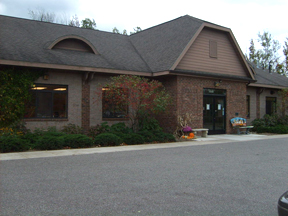
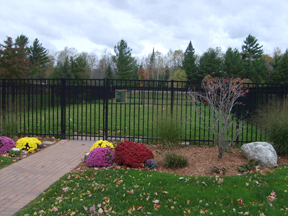
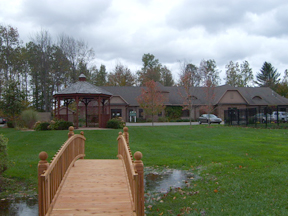 '
'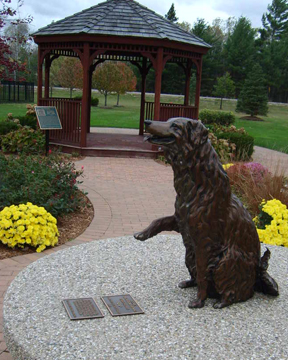
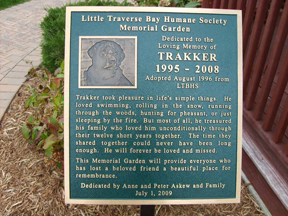
The shelter has been in existence since 1953 but recently celebrated it's ten year anniversary in its current facility on October 1st. Ten years ago, they launched a capital campaign to raise the funds to build their new facility (about $750,000). They wanted a larger space that was more efficient for the workers and offered a better quality of care for their cat and dog residents. Some of the many amenities include heated floors, fenced-in yards and an area for free-roaming cats. Since moving into this newer building, they have cared for more then 5,000 animals and found homes for most of them.
The Humane Society is a private non-profit organization that offers a temporary home to companion animals who have lost theirs. The Little Traverse Bay Humane Society is a no-kill facility (since 1996), only euthanizing animals that are very aggressive and extremely sick or injured. No animals are euthanized for space. In 2010, they only euthanized three animals because of aggression or medical reasons. Unlike other shelters, the euthanizations occur off-site by a veterinarian so that the staff doesn't have to be involved in the actual procedure.
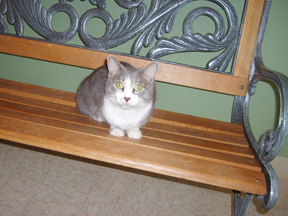
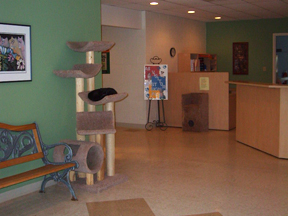
Their mission is to offer a warm shelter, veterinary care and personal attention to all of the animals while they are in their care. They also utilize proactive methods in controlling animal overpopulation. They are committed to educate the public on the humane treatment of cats and dogs. The LTBHS is run by a board-of-directors who oversee the finances and future goals of the organization. The staff takes care of day-to-day operations and policy decisions.
The Humane Society is not an open admissions shelter. They take in adoptable animals from the Emmet County Stray Center, owner surrendered pets and also animals from other counties and states. Deter Racine, Executive Director, has been with LTBHS for over ten years and says that they don't like seeing empty kennels because it means they could be helping a pet in need. That's quite a difference from the normal shelter attitude where empty kennels seem to be the goal, whether the animal was adopted or killed. LTBHS has taken in animals from the Katrina rescue from New Orleans, Mt. Pleasant, Antrim County and many other places. Their supporters also come from all over the state and country as well.
When asked why they are able to be no-kill when others can't or won't do what it takes to get there, Racine says that their success lies in their great supporters and the supplemental programs that the Humane Society offers. Some of these programs include the Pit Stop Program (free spay/neuter, microchipping and vaccinations for all Pit Bulls for the community), Mutts with Manners Program (LTBHS provides shelter dogs with basic obedience training, addressing behavioral issues), Ruff-to-Ready Scholarship Program (continuing dog training for shelter dogs adopted at LTBHS), The Angel Program (pet therapy with shelter animals), a Low-Cost Spay & Neuter Program for low income families, School Age Education, The Good Samaritan Fund (provides for emergency medical care for the shelter, including medical procedures and tests, special dietary foods and medications) and more. You can take a better look at their programs at this link.
LTBHS can hold 21 dogs and 40 cats. They allow their cats to walk freely around the cat room and not be confined to their cages. In fact, there were a few cats walking around the lobby to greet me!
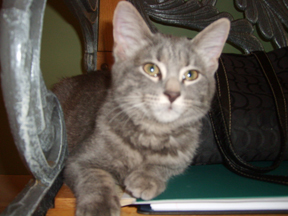
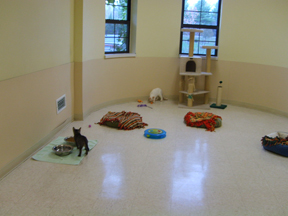
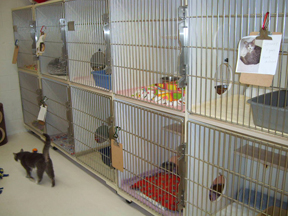
Their dogs also get a lot of exercise in their larger fenced off areas. The dogs are tested for heartworm upon admission (and puppies for Parvo). The cats are feasted for Feline Leukemia and FIV. All animals are vaccinated, spayed/neutered and microchipped before leaving the building. The average stay for a dog before getting adopted is about two weeks. For cats, it's a bit longer - between six months and a year.
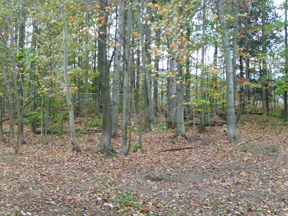
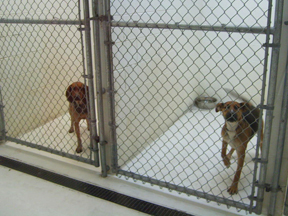
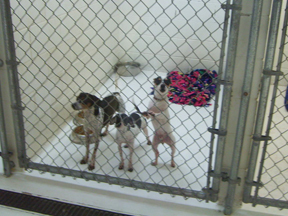
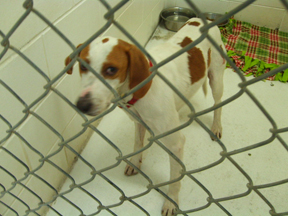
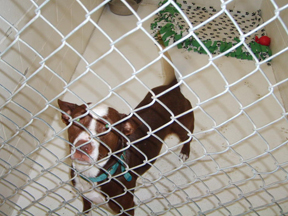
Although they don't regularly utilize foster homes, they often seek them out in unique situations like when there is a need to bottle feed kittens or puppies. They also come in handy if an animal is not doing well in a shelter environment and needs a little special attention. They appreciate volunteers and are currently looking for people who want to coordinate committees and help with fundraising.
The most pressing issue is, of course, having enough donations to keep everything going. Although the on-site boarding business helps with shelter revenue, they are dependent on the financial help from their great supporters. They also accept donations of blankets, toys and food for the animals.
Please send donations to:
Little Traverse Bay Humane Society
1300 West Conway Rd.,
Harbor Springs, MI 49740
Phone (231) 347-2396
Website
Facebook Page
Email
Second Chance Rescue Group Helps the Bigger, Often Overlooked Animals in Need
When you think about animal rescue groups, most of you will usually visualize cats and dogs. The Second Chance Ranch and Rescue (SCRR) is a different, special kind of organization. They rescue horses and other farm animals.
Their mission is to rescue animals who are in neglect or abuse situations, abandoned animals or those whose owners are undergoing severe hardship. All cases are reviewed by their board before acceptance except for those that are confiscated by animal control or sheriff's departments. SCRR does not take in animals due to relocation, behavior or health problems. They work with the neediest animals - the most urgent cases. Animals seized by animal control offices have the highest priority.
If an owner would like assistance in relocated their pet, SCRR may be able to offer names of people interested in obtaining a new animals. The organization is willing to list the animal on their Petfinder adoption site, not be be "sold" but "free to a good home." SCRR will charge the adopting owner an adoption fee that will go towards saving other animals.
SCRR was started in January 2011, but Veterinarian Pam Graves started rescuing farm animals on her own in 2005 after a move to the country. She says, "I have always loved animals. Being a veterinarian, it kind of comes with the territory. I had plenty of opportunities to take in the unwanted, rejected, ill or injured animals. Over time my staff at Jensen's Animal Hospital started calling my house the 'Second Chance Ranch.'"
After a friend bought her a sign for her barn, she began thinking about how she could help the unwanted farm animals in her community. There are very few equine rescues around the Northern Michigan area and she knew that she could help with that problem. Because farm animals are so large and many live a long time, there is an increased cost to the owner and harder to find help when it's needed. And because of this need, the Second Chance Ranch and Rescue was started.
SCRR currently has seven board members, which includes a veterinarian, farrier and trainer among others. The animals are currently fostered at the home of Pam Graves, a veterinarian at Jensen's Animal Hospital, although the group is looking for donated land and outbuildings so that they can run a larger operation. They differ from other farm animal organizations in that they have several professionals who work with animals on a regular basis as well as other medical professionals and educators who provide incredible knowledge to their cause.
To date, they have adopted out eight horses and currently have two in their foster program, Scout and Sugar. They also have a few other adoptable animals including a pig named Hope and a goat named Clover.
UPDATE: SCRR recently took in five horses from an abuse case downstate in Livingston County. Click here for a link to the original report.
Twelve horses had been starved and neglected. Four of the horses are at the Walloon Equestrian Center in Charlevoix County and stallion is the SCRR ranch in Boyne City. The five horses are being taken care of at the Walloon Equestrian Center in Charlevoix County. For the updated information on the story, click here.
Volunteers, donations and fosters are always needed. Adoptive homes for the horses will be needed after the trial. If you can help out on any part of the rescue, please email Pam Graves here.
Whether SCRR is in the middle of a rescue or just operating normally day-to-day, the most pressing needs are foster homes and money to support ongoing operations. Finding funding and people to adopt the horses is always a challenge and any support from the community would be appreciated. They look forward to helping many horses and farm animals in the future.
Contact Info:
Second Chance Ranch and Rescue
05603 Church Rd.
Boyne City, MI 49712
Website
Facebook site
Email
Pet Crisis Center in Bellaire is Now Open to Help Antrim County Pets During Emergencies
After seven years of planning, fundraising, building, decorating, and cleaning, the Pet Crisis Center in Bellaire is now a reality. It has been open about a month and they just had their very successful grand opening celebration on Wednesday, July 27th.
The Pet Crisis Center is a place that's available to residents of Antrim County. Even though WaLHFMF receives donations from all over Michigan and the United States, it was decided early on that the Pet Crisis Center would serve Antrim County only to see what could be accomplished in their own backyard.
(above - Before you enter the center, you will see a fountain and bricks purchased in memory of pets)
They will be working with local agencies including Antrim County Animal Control, Meadowbrook Care Facility as well as mental health and family services. They are a place of last resort when an emergency happens. Some of these emergencies include a pet's owner having a house fire, a domestic abuse situation, a military person leaving for duty or an elderly person who has to go into a nursing home. When the Pet Crisis Center can't reunite the pet with their owner, the animal will be put up for adoption.
(above - Sugar is 10 years old. She is the center's office cat but is up for adoption.
Her human Mom has MS and is now in a nursing home. She came in with 2 other cats Precious and Princess also up for adoption.)
During my tour at the Center, I was very impressed by the building. It's very clean, organized, colorful and welcoming. They use non toxic cleaning products as well as recycled newspaper litter and recycling within the center. They also have easy-to-clean floors and walls so that volunteers' time can be better spent with animal care and not cleaning. Everything seems to have been well thought out to enhance the lives of the pets.
The dogs have their own spaces, both inside and out, and also have a big play area in the back to run and enjoy.
The two dogs who were there during my visit were able to access most of the building and followed us wherever we went. The gorgeous Pit Bull mix, Brindle, who is at the center because her owner left for Army bootcamp ended up in almost every picture as she made sure she could see what we were up to.
(above - Brindle is a 9 month old Pit Bull mix. She has a wonderful personality and loves everyone including cats. Her owner has gone to Army boot camp. He has decided because his future is uncertain and Brindle is young to give her up for adoption.)
The cats have nice kitty condos with separate litter areas. During the day, the doors are all open and they are free to roam around the room and sit in front of the window.
(above - Don Juan is a young 12 years old, loveable and handsome. Adjusting to not being the only pet after being with his owner his whole life, Don Juan is doing pretty well with the others notice Princess in the background. His human Mom went into a nursing home and would like to see Don Juan adopted once more.)
(above - Snuggles came in with her sister Callie. They are three years old and their owner could no longer take care of them because of declining health. They hopefully will be adopted out together.)
(above - George came in with his friend Kittle. They stayed at the center while their owner got through a crisis and were reunited with him the day after this photo was taken. We love those happy endings!!)
Many of them have decided to move to new addresses during the day (i.e. they have decided their "assigned" quarters are only for sleeping and find a new condo during their free time). Others have decided to sit on top of the condos to properly supervise the cats down below.
(above - Pooh is WaLHFMF' front page adopt-a-pet in the summer newsletter. He is about 4 years old and a very nice cat who just loves attention. His owner went to jail and signed him off to be adopted.)
Getting the center built was a true community effort with many local
businesses donating their labor for free and offering their material at cost so that the donated money could be stretched as far as possible. Many individuals also donated time and money to make the center a reality. It was a labor of love for many.
I encourage all of you to visit the center and see what a remarkable accomplishment it is. I believe it's a model that could be used in all of our communities. It can be used as a stop-gap measure to keep pets from entering animal shelters when sometimes the reason they are there is a result of a temporary situation.
With as Little Help From My Friends is willing to share all that they learned along the way to others interested in starting a similar facility in their county.
Kalkaska Animal Shelter in Need of Community Support
I am always a little apprehensive when I walk into a county run animal control building. It's usually a whole different vibe than a Human Society or a rescue group. First of all, it's a law enforcement department. Secondly, because it's a government run shelter, there are always laws, policies and rules that must be abided by, whether they make sense or not. Thirdly, it's almost always a higher kill shelter than the others.
That said, there were some positive things I found out about the shelter. The county does allow volunteers, but because they are often unreliable and the animals HAVE to have their needs met, it's not something that usually happens. The shelter does have a washing machine, and unlike our own animal control department in Grand Traverse County, the dogs are allowed to have blankets and toys. In fact, blankets, toys, food and cleaning supplies are very much needed by the shelter. So if you have any of these things in your house, please consider donating them to the shelter. I also saw an honest respect and caring for the pets at the shelter. When I walked in, the office assistant was cuddling a small puppy who had been crying in its cage.
There were also some things that I think need improvement on, but because the county lacks the staff and the money, it needs to happen with a community effort. I didn't like the fact that most of outside dog pens are uncovered. It would take a lumber company and some volunteer hands to build some kind of tall structure with a cover so that the dogs wouldn't have to brave the elements directly. The day that I was there was one such example, when it was raining.
Some other things inside of the building are harder to address - the small dog cages and the draftiness of the cat area. It's an old building. My suggestion would be to ask for a higher millage on the next go-around and try to find a better facility for the animals - or build a better shelter on the same property. That's an issue for the community to decide on. The last millage was voted on in 2010. It's up every four years. Here's a link to a story about the millage from last year. I remember reading a story about the animal control staff wanting to find a new facility. Maybe a building fund could be set up for that specific mission?
The county has limited information on the animal control department on their website. One very important improvement to the services of the animal control office would be to place their pets to be on Petfinder so that people in the city - and outside the city - know what kind of pets they have available. It would undoubtedly increase adoptions. If I am searching for a female Beagle and they have one, they wouldn't currently come up in my search criteria. I don't have time to drive out to all of the shelters in a 100-mile radius. The internet is great for finding pets. The only hitch is that with only two staff members (and one having her hours cut down to 32), it's hard to find the time to take the photos, post the information and respond to the increase in inquiries from the public. But I do think it's worth the effort if it can be done. I think lives would be saved. If the staff can't afford the time, maybe it should be a volunteer position or delegated to someone else who works for the county.
One last suggestion would be to have more community friendly hours than their current hours of 8 am to 4 pm. Obviously, they are too short staffed to have extended evening hours or weekends. But most people can't go to the shelter during those hours. This might be another area where they could utilize a volunteer to come in and assist them while a staff member is already there cleaning and feeding the animals. Even a small two hour block would be helpful to people who want to claim their animal or adopt a pet after-hours or on the weekend.
The shelter itself can hold fifteen dogs (if in individual kennels) and ten cats. There is no funding to test the animals for diseases when they enter but if there is an obvious injury or illness, they are taken to a vet. They also don't have funds to spay or neuter animals upon adoption but they do require a deposit to do so from the adopter (state law).
The shelter takes in owner surrenders and stray dogs and cats. They don't pick up stray cats as there are no county laws governing them. They have, on occasion, had to deal with issues involving horses, cows and other animals. Most of the dogs at the shelter appear to be Hounds and Pit Bulls. Animal Control Officer, Chuck Hill, said that it's about 50/50 as to whether the animals they take in are stray or owner surrendered. They are an open admission animal control, but there is a waiting list for owners if the kennels are full. Under Michigan state law, animals without a collar and tag are held for four days and animals with a collar and tag are held for seven days. These days do not include the intake day, holidays or weekends. After that time, the pets are available for adoption if they are healthy and non-aggressive. The shelter has a microchip reader which was given to them by Banfield Pet Hospital in Traverse City.
Animal Control Officer Chuck Hill has been there for 11 years and works full time. He's responsible for enforcing ordinances relating to animal abuse, neglect and animals at large. He's had animals all of his life and has always been in the animal business one way or another.
Office assistant Sara Crawford has worked for animal control for five years and was a volunteer for about four or five years before that. She currently works 32 hours a week. Someone has to be at the shelter at some point every day, even on a weekend or holiday. The office deals with a 580-square mile range. They serve the needs of Kalkaska County, not just the city itself. The policies and procedures of the animal control office are under the direction of the Sheriff's Department and Sheriff Dave Israel.
The shelter doesn't do fundraisers but others in the community have raised money for them, including Glen's Food and Rapid City Elementary. If you'd like to make a donation, please stop by the animal control building at 605 North Birch Street in Kalkaska. All donations are tax-deductible. As always, time and money are biggest factors that decide how they are able to care for the animals that come into the shelter. Please consider helping them out in anyway that you can. Their phone number is 231-258-3309.
There is an animal welfare organization in Kalkaska that has helped the shelter in the past called Northwoods Animal Coalition (NAC). They were previously called KCA (Kalkaska Citizens for Animals) and started their group in 2000. They are a grassroots all-volunteer non-profit organization dedicated to addressing issues related to the humane treatment of animals in the greater Kalkaska area. In the past, they provided equipment, fencing and dog houses to the shelter as well as helped rescue and place numerous dogs for them. Currently, I don't think they are working closely with the shelter anymore.
NAC regularly holds spay/neuter and vaccination clinics and provide low-cost or free vet care and spay/neuters to low-income owners in Kalkaska and the surrounding area. I think a group like this is a great start to helping the shelter with some policy and physical improvements that are needed, as well as saving staff time and saving taxpayer money. Perhaps there could be some kind of shelter/community liaison to facilitate volunteer work with the shelter schedule so that both animals and taxpayers could be better served.
As I stated above, government run shelters have limited resources and rules and policies that the general public often isn't aware of. They are also slower to respond to changes, even good ones, but some are open to suggestion and help from outside.
My suggestions are being offered to the county and the community in the best interests of the animals in Kalkaska. It's up to the community to work with the county if they want changes to be made. I am hoping that the community is, in fact, dedicated to saving more lives at the shelter. It's kind of sad to see this run down shelter behind a glorious sports complex and wonder why ice skating and hockey are more important than saving the life of a Kalkaska pet?
A Visit to the Charlevoix Humane Society Shocases Playful Cats (December)
There is an area in the Charlevoix Humane Society (in Boyne City) that the cats probably miss when they get adopted - the outside cattery. As I watched the cats play in the screened in area, I knew that if my own cat were to visit, he probably would want to stay so that he could enjoy the gentle breezes and watch the birds fly by.
The inside cat area is nice too with open cages and cats rotated throughout the day so that they can play together, mingle with potential adopters and enjoy the outdoor cat room by going through the little cat door. Allowing cats to live a more "normal" life and not be continually confined to a cage helps their stress level and adopters can get a better sense of the cat's true personality.
The welfare of the dogs is also given a high priority. Unfortunately, I wasn't able to photograph them as they were being walked in back of the building while I was visiting the cats. The dogs are given beds, blankets and toys for stimulation, walked several times a day and get a lot of yard time. Like most other shelter these days, Pit Bulls and Pit mixes make up a large amount of the dogs that end up in the Charlevoix Humane Society.
They also get a lot of hounds and hound mixes as well. The shelter makes use of local trainers and have trainers on staff to work with the dogs. The shelter manager even holds a degree in Biology with a special interest in canine behavior.
The Charlevoix Humane Society is equipped to hold 20 dogs and 30 cats. However, they are often overwhelmed by the number of cats coming in and many times have upwards of 50 cats in their care, using a combination of foster homes and using every available space in their facility.
In the last two years, they have been able to foster, transfer and adopt any healthy and adoptable animals, thus providing for what they said was a "live release rate for dogs in the 93% range." Cats, because it is an ongoing educational issue, provide a challenge since a large number of cats coming into their open admissions shelter are feral and thus unadoptable. They attempt to convince the people bringing the wild cats in to let them alter and return the animals, but as of yet their success rate with that strategy is only about 20%. They do have traps available for people who want to do TNR (trap/neuter/return).
It is their policy to give every animal a chance. If, after temperament testing (they do two separate sets of testing) they find an animal too aggressive or too poorly socialized to handle the stress of being housed at the shelter or even in a foster home, they will euthanize the animal.
The Charlevoix Humane Society is a 501(c)3 non profit with a volunteer board structure which makes policy under the guidance of the executive director. They have a service contract with the county to care for incoming strays and to deal with the public when redeeming their pets. This agreement allows for a small stipend and a fee-free building lease. They do not own the building or the land and therefore are unable to expand beyond our current level of service. The board is currently in the process of developing a plan to build a new facility which will allow them to offer more community services such as education, training, boarding and grooming, pet day-care and more appropriate facilities for longer term holding of animals awaiting adoption. The current facility would continue to house strays and serve as short term holding.
The current building went into use in 1998 but the Charlevoix Area Humane Society has been in existence since 1974. It is currently attached to the animal control but they are separate entities. The Humane Society receives their animals from animal control and the public as owner-surrendered pets. When the cats arrive, they are tested for feline leukemia, FIV and heartworm. Dogs from the hunting breeds (hounds primarily) are tested for heartworm and if they are transferring dogs to other rescues or shelters they will often test for heartworm as well. Any animal that comes in injured is seen by a veterinarian and treated within financial reason.
The Charlevoix Humane Society started spaying & neutering every pet before adoption three years ago. All pets are now altered before leaving the care of their facility. They are also up-to-date on vaccinations and microchipped as well.
From April through October they hold one to two clinics per month with discounted spay and neuter prices as well as discount vaccinations through the services of a "retired" veterinarian that spends his summers close by in northern Michigan. The rest of the year the Humane Society works with the public for as long as their funds last to provide assistance to low-income pet owners looking for help with spaying and neutering their pets and also emergency medical when they can.
In addition to adoptions at the shelter, they also take the animals to off-site adoptions one or two times a year so that they can be seen in other venues. In addition, they also will transfer animals to other rescue groups and breed-specific groups is the organization is a legitimate 501©(3) non-profit. They regularly use national breed club rescues to take on purebreds that come into the shelter.
The Charlevoix Humane Society allows volunteers in their facility to help with animal care and are always looking for people who can help with fostering animals or can work on fundraisers.
When asked what would help them have less euthanasias, they said that a formal, organized TNR program would be the biggest help at this point. Additional space and a facility more adequately designed for long term holding of pets with space for activities to stimulate and work with the animals would also be extremely helpful.
The most current pressing need is financing their current programs and eventually funds for expansion. They are spending nearly $15,000 per year on their spay and neuter program but could easily spend twice that assisting the community at large so donations to their operating funds and their spay and neuter program are the most pressing needs they have.
If you want to adopt an animal, donate or volunteer, please contact them:
614 Beardsley Street
Boyne City, Michigan 49712
Phone (231) 582-6774
www.charlevoixhumane.org